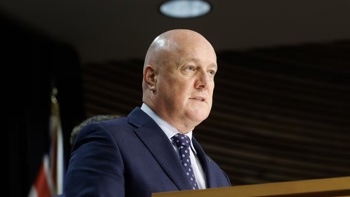Government ministries are scrambling to cut costs by between 6.5 and 7.5 per cent ahead of the coalition’s first Budget. For MBIE, that means finding savings of around $412.5 million. To help achieve this the ministry’s been working through a voluntary redundancy process since the start of the year. Azaria Howell looks at how many staff have taken up the offer to leave.
The Ministry of Business, Innovation, and Employment is one of the New Zealand Government’s largest agencies employing more than 6000 people, making the cost-cutting task before it no mean feat.
MBIE has been asked to find cost savings of 7.5 per cent before the May Budget, equating to roughly $412.5 million.
A voluntary redundancy process was introduced in January with the ministry now confirming 111 people have been accepted for voluntary redundancy.
The process was originally scheduled to run from January 23 to February 7. However, the day after applications were due to close, the scheme was extended another week.
Official communications to staff from MBIE around its bid to slash costs can now be revealed.
 MBIE's main building in central Wellington. Photo / Mark Mitchell
MBIE's main building in central Wellington. Photo / Mark Mitchell
MBIE had its first taste of Government-directed savings targets in August last year, when the then Labour-led Government asked the agency to find two per cent savings, approximately $110 million.
Seven months on and MBIE now needs to find 7.5 per cent savings, which would equate to roughly $412.5 million.
An email from MBIE’s Building, Resources and Markets Group leader Paul Stocks, from August 29, shows the initial proposal from the previous Government was “taking place against a backdrop of a challenging economic situation and fiscal headwinds.” The ministry first considered finding savings from unfilled vacancies, and careful use of contractors and consultants.
The Act Party meanwhile was vowing to issue “stop-work notices” to MBIE staff and halve the ministry’s headcount should it get voted into power.
On August 31 the ministry’s Corporate Services and Finance Group were told announcements and commentary about job cuts “can be unsettling as public servants”. The memo did not specifically link to any policies or announcements.
Stocks sent another email to all ministry staff three days before the 2023 general election, highlighting the importance of political neutrality and once again speaking about cost savings. “We have also been doing work to identify potential reprioritisation options to meet our fiscal sustainability goals and deliver on the incoming Government’s priorities”.
The Act Party held a media stand-up five days before the election outside MBIE’s office in central Wellington. In the speech to media, leader David Seymour took aim at increased spending and co-governance structures in the public service.
“Government departments have made New Zealanders’ lives more expensive,” Seymour told the cameras, as voters headed to the polls.
Following the election, but prior to the formal announcement of the coalition, more emails were sent.
Communications on behalf of People & Culture Manager Richard Griffiths reveal MBIE was considering the roles that are currently under recruitment, and would only be replacing those deemed “business critical”.
Staff were told on October 30 the decision may impact work people are doing, or how quickly they can deliver outcomes.
On the same day, Digital, Data & Insights group leader Greg Patchell told staff there would be a pause on “any significant new work or big decisions”, and also acknowledged many public servants were in a time of uncertainty.
As coalition talks were ongoing, and politicians were spotted going in and out of hotel lobbies for secret chatter, public service agencies kept ticking on with their plans to slash spending.
On November 8, Paul Stocks emailed all MBIE staff with an update on spending. The email pointed out the Government “will have an ambitious agenda,” including a mini-Budget and 100-day-plan.
Workers were told an immediate action was set by the ministry’s senior leadership to reduce discretionary spending by 15 per cent - meaning a slash on travel, training, catering, venue hire, leaving functions, and gifts was on the table.
Stocks sympathised with workers, adding “I know this might seem a bit tough [...] it is unlikely we will receive funding for new initiatives and we will be facing additional cost pressures”.
After the coalition was formed, the race to deliver the mini-Budget was on, as many ministries wrapped up work in the lead-up to the festive season.
On December 8, MBIE staffers received another email from Paul Stocks around the next steps with the new Government. Staff would be working on ministerial briefings and understanding the 100-day-plan - at a senior leadership level, costs were front-of-mind.
In the email, Stocks acknowledged many MBIE workers would be feeling “a little apprehensive,” and encouraged people to flag concerns with their managers.
Staff were greeted with another email from Stocks, titled “Xmas Stocksings [sic],” on December 21 - the same day Finance Minister Nicola Willis unveiled her mini-Budget.
The issue of staff feeling under-pressure was once again brought up.
In the email, Stocks said “Many of you mentioned that you were feeling tired and also worried about how the workloads are going to be managed”. All cost centre managers were asked to adjust their forecasts for discretionary spending by the end of January.
Throughout January, the voluntary redundancy scheme was floated as a way to cut back on costs.
A staff webinar took place on January 24 with MBIE’s Chief People Officer and clinical psychologist Dr Barbara Rysenbry around making “informed decisions”.
The day after the ministry’s voluntary redundancy scheme was extended, Te Waka Pūtahitanga deputy secretary Melanie Porter reiterated the idea the scheme was “entirely voluntary,” and a decision would have to be made based on personal circumstances.
Not all applications for redundancy would be accepted.
Porter encouraged staff to reach out to their peers, manager, or wellbeing support, and to focus on things that bring them joy at a time of uncertainty and change. She added the focus would be “results-oriented” primarily.
Workers were thanked for their patience during the change process in Porter’s email: “Of course it is going to take time but I know the waiting and watching isn’t easy.”
On February 23, more details were announced to staff around the voluntary redundancy scheme. People & Culture manager Richard Griffiths noted not everyone who applied for voluntary redundancy would get it, adding it “will be disappointing for some.”
The ministry had also confirmed it had looked to extend people’s departure dates to ensure key deliverables could still be met.
Griffiths’ memo appeared to express the view the scheme would impact what the ministry could achieve.
“What this will also mean is less people to do the work we need to do,” he said, encouraging staff to work with managers to devise new strategies to deliver what they’ve promised. Workers were told to prioritise items, make trade-offs, and even look at stopping some projects.
Final decisions on cost-savings will be signed off by Finance and Public Service Minister Nicola Willis.
Azaria Howell is a Wellington-based multimedia reporter with an eye across the region. She joined NZME in 2022 and has a keen interest in city council decisions, social housing and transport.
Take your Radio, Podcasts and Music with you









